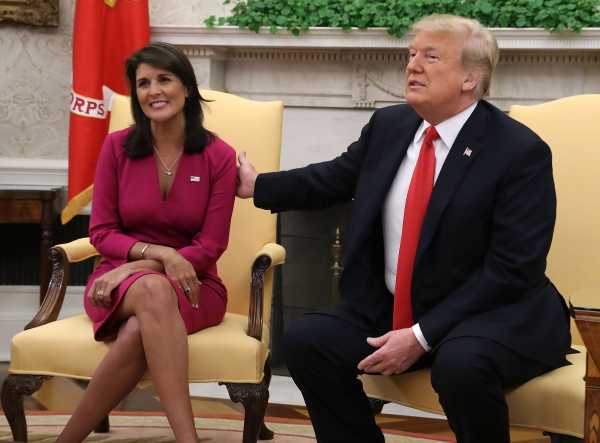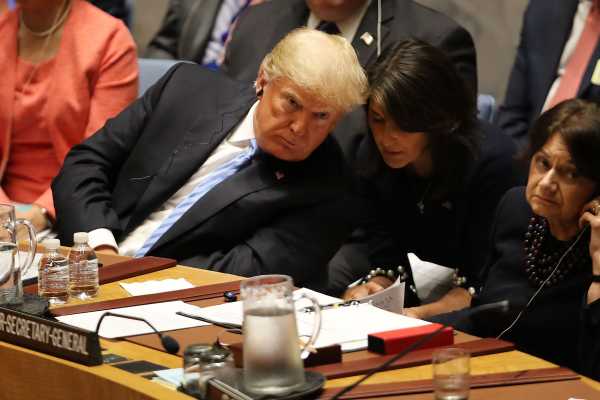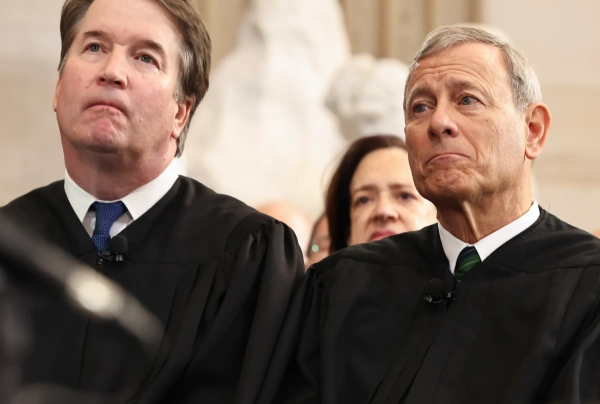
Departures from the Trump administration tend to be pretty acrimonious. But US Ambassador to the United Nations Nikki Haley’s resignation, announced in a surprise Tuesday morning sit-down with President Trump, was a striking break with the past.
Trump went out of his way to praise Haley’s work, saying that “she’s done a fantastic job” and that “we’ll be in constant touch” even after she leaves at the end of the year. Haley returned the favor, calling her time working for Trump “the honor of a lifetime.”
By Trump standards, this was the equivalent of a 12-gun salute. Previous high-profile departures, like Steve Bannon’s or Rex Tillerson’s, came amid reports of infighting and presidential anger. But Haley managed to maintain good relations with not only the president, but the conservative movement and the American public in general.
An April 2018 poll from Quinnipiac, for example, found that Haley had a 75-9 approval rating among Republicans — and a 55-23 rating among Democrats. In these polarized times, the idea that one of Trump’s top allies could maintain such high favorables among both parties beggars belief, yet Haley managed to pull it off.
Whatever one thinks of Haley’s job performance substantively, there’s no doubt that it was brilliant politically. She’s significantly improving her chances to be president down the line. The reasons appear to stem from both from her ability to manage Trump personally and the issues she chose to focus on, particularly the Middle East.
Haley, perhaps more than any other person in politics today, acted like she understands the real ideological fault lines in modern America — and figured out how to manipulate them to her advantage.
How Haley got American politics right
Top foreign policy jobs can be a great launching pad for politicians to build up public support. Even Hillary Clinton, one of the most polarizing figures in American politics, had favorability ratings in the 60s when she served as President Obama’s secretary of state.
But Haley’s policy approach was particularly canny. She focused significant amounts of attention on two things — hostility to Iran and support for Israel — that have wide and deep support across Republican factions.
President Trump has withdrawn from the Iran deal and given Israel an unprecedented blank check on its treatment of the Palestinians. These are two of the few concrete policies that the most Trump-hostile Republican faction, neoconservatives who object to his overall “America First” foreign policy, generally support.
This owes to longstanding trends inside the Republican Party, like the rise of pro-Israel evangelical theology over the past several decades, and to more recent ones, like hostility to Obama and the nuclear deal unifying the GOP in taking a hawkish stance toward the Islamic Republic. Haley, who was governor of South Carolina before her current job, appears to have a deep understanding of conservative movement politics — and, as a result, knew exactly what buttons to push to make herself into a heroine for the right.
This is why her tenure got effusive praise from both Trump and conservatives who count themselves as Trump skeptics.
“She has been excellent in her role, a fierce defender of American interests, and a critic of the UN’s corruption and moral failures,” Guy Benson, a prominent Trump-critical conservative, writes at Townhall.
How Haley managed to criticize Russia and win over Trump at the same time

Haley has also repeatedly discussed a touchy issue — Russia. Given the special counsel investigation and Trump’s deeply unpopular personal overtures to Vladimir Putin, it’s a hard issue for Republicans to discuss without getting in trouble. That’s doubly true since when it comes to actual Russia policies like sanctions, Trump has clashed with traditional Republican hawks who want a tougher line on the Kremlin.
Haley has mostly sounded like one of those hawks. She has repeatedly condemned Russian human rights abuses in Syria, its war in Ukraine, and even its interference in the 2016 election. But she went out of her way to cast these arguments as a defense of the Trump administration’s overall approach to Russia, and in fact even a rebuttal to the argument that Russia interfered in the election to help Trump.
“In the last year, this administration has been tougher on Russia than any American administration since Ronald Reagan,” she said in a February 2018 speech. “I have no idea what Russia expected from the American elections, but I gotta tell you, they are not happy with what they ended up with.”
This kind of anti-Russian rhetoric still infuriated some of Trump’s hardcore supporters on the far right. Infowars writer Paul Joseph Watson blasted her as “a neo-con and an establishment crony who advocated the very foreign policy positions that Trump ran against;” pundit Ann Coulter tweeted after Haley’s departure announcement that “the average I.Q. of Trump’s cabinet went up 10 points today.”
Yet it not only appealed to neoconservatives and Democrats but also didn’t alienate Trump himself. Partly that’s because it casts him as both a strong leader and a victim of a smear campaign painting him as a Russian pawn.
And Trump just plain liked Haley overall. It seems that by toeing a very pro-Trump line publicly, and working hard to gain the president’s trust behind the scenes, Haley immunized herself from a hardline #MAGA backlash. What matters to Trump’s base is that Trump himself approves of you; the actual ideological valence of your foreign policy positions is relatively secondary by comparison.
This is a thing about Trump Republicans that Haley seems to understand better than all other Republicans. Aside from a few relatively fixed points, like hostility toward immigrants and Black Lives Matter, Trumpism is pretty much what Trump makes of it. His hardcore supporters aren’t so much attracted to particular positions, particularly on foreign policy, as they are to Trump as an individual. It’s his affective and emotional approach, together with his reactionary stance on identity issues, that binds his supporters together.
Haley’s actions suggest that she got this at a deep level. By building a strong personal relationship with the president, and pitching her rhetoric in just the right way, she was able to deviate from the Trump line on Russia without alienating Trump and the broader GOP in the way that, say, former Secretary of State Rex Tillerson did. As a result, she had a more politically successful time in office than anyone else who has left the Trump administration to date.
Sourse: vox.com






